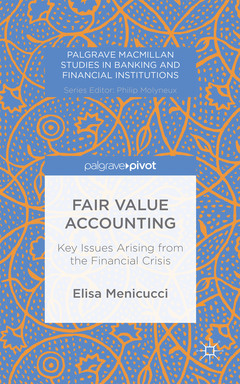Fair Value Accounting, 2015 Key Issues Arising from the Financial Crisis Palgrave Macmillan Studies in Banking and Financial Institutions Series
Langue : Anglais
Auteur : Menicucci E.

The 2008 financial crisis has turned a spotlight on the role of financial reporting in periods of economic downturn. In analysing the financial crisis, many commentators have attributed blame to fair value accounting (FVA) because of the pro-cyclical effect it potentially introduces in banks' financial statements. This book discusses how FVA affects financial reporting during a financial crisis. It provides an in-depth analysis of the key benefits and negatives of FVA, and discusses the controversial practice of trade-offs with historical cost accounting (HCA). It provides an overview of the principles and applications of FVA, and explains its impact on banks' financial statements. Investigating the effect of FVA on the volatility of earnings and regulatory capital in European banks, the book asks whether incremental volatility is indeed reflected in bank share prices. It examines empirical evidence to quantify the role that FVA may have played in times of stress in the banking sector, both in Europe and elsewhere. Fair Value Accounting explores the criticism FVA has received despite its perceived merits, and summarizes the various opposing views of parties in this major policy debate, which has involved banking and accounting regulators from across the globe.
1.1. Introduction 1.2. Background Information About The Financial Crisis 1.3. Features Of The Financial Crisis 1.3.1. Features Of The Financial Crisis And FVA 1.4. The Debate On The Role Of FVA In The Financial Crisis 1.4.1. Studies On FVA In The Financial Crisis 1.5. Concluding Remarks 2. Fair Value Accounting (FVA): An Overview On Key Issues 2.1. Introduction 2.2. Fair Value In Contemporary Accounting Standards 2.3. Theoretical Foundations Underlying FVA 2.4. Definition Of Fair Value 2.5. The Use Of FVA: Fair Value Hierarchy 2.5.1. Fair Value Hierarchy In US GAAP 2.5.2. Fair Value Hierarchy In IAS/IFRS 2.6. The Use Of Fair Value In IAS/IFRS 2.6.1. Fair Value Measurement For Financial Instruments 2.7. Historical Cost Accouting (HCA) 2.8. FVA Versus HCA 2.8.1. FVA Versus HCA Within A Financial Crisis 2.9. Concluding Remarks 3. The Role Of Fair Value Accounting (FVA) In The Financial Crisis 3.1. Introduction 3.2. FVA And Implications In The Financial Crisis 3.3. Fair Value In Normal Economic Conditions 3.3.1. Relevance Versus Reliability 3.4. Fair Value In Financial Crisis Conditions 3.4.1. Criticisms On Fair Value 3.5. Key Observations On Fair Value Arising From The Financial Crisis: Volatility And Pro-Cyclicality 3.5.1. Fair Value And Volatility 3.5.2. Fair Value And Pro-Cyclicality 3.6. Concluding Remarks 4. Fair Value Accounting (FVA) In Banking Sector 4.1. Introduction 4.2. The Impact Of FVA On Banks' Financial Statements 4.2.1. FVA And Increased Volatility Of Information In Financial Statement 4.3. FVA And Volatility In Earnings And Regulatory Capital 4.4. FVA And Financial Stability 4.5. Practical Implications And Perspectives For FVA 4.6. Lessons From The Financial Crisis 4.7. Concluding Remarks
Elisa Menicucci obtained degrees in economics and business administration, and economics and management, from the University of Ancona and the Polytechnic University of Marche respectively, in Ancona, Italy. She went on to complete a PhD in business administration from the Polytechnic University of Marche in 2009. Elisa Menicucci works as temporary professor in business administration at the Polytechnic University of Marche, and as teaching expert in business valuation at Uninettuno University in Rome, Italy. She has participated in the International Commission of OIC (Organismo Italiano di Contabilità) and has worked as a chartered accountant and tax auditor since 2008.
Date de parution : 12-2014
Ouvrage de 121 p.
14x21.6 cm
Thèmes de Fair Value Accounting :
Mots-clés :
Fair value; Financia Crisis; pro-cyclicality; volatility; financial instruments; capital; financial crisis; GAAP; IAS; IFRS
© 2024 LAVOISIER S.A.S.



